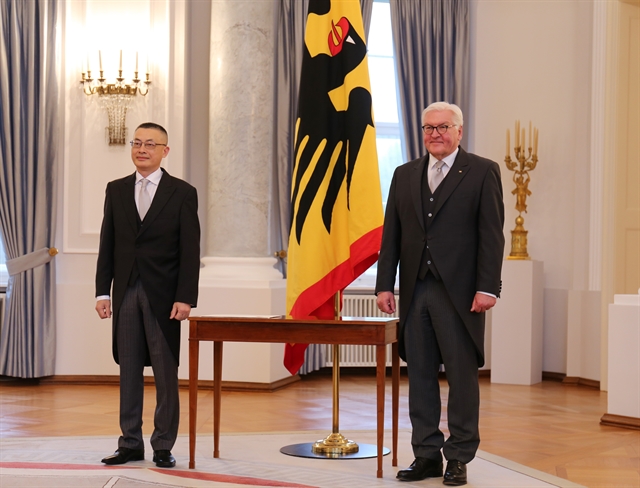 Politics & Law
Politics & Law

 |
| German President Frank-Walter Steinmeier (right) and Vietnamese Ambassador to Germany Vũ Quang Minh at a ceremony to present the ambassador's letter of credentials. — VNA/VNS Photo Phương Hoa |
BERLIN/HÀ NỘI — German President Frank-Walter Steinmeier’s state visit to Việt Nam, which begins Tuesday, is of great significance for the growing bilateral relations between the two countries, said Vietnamese Ambassador to Germany Vũ Quang Minh and German Ambassador to Việt Nam Guido Hildner.
In an interview granted to the Vietnam News Agency ahead of the trip, Ambassador Minh said the strategic partnership between Việt Nam and Germany had developed substantively across multiple aspects in recent times, especially after Prime Minister Olaf Scholz’s official visit to Việt Nam in November 2022.
Political trust had been enhanced through meetings at all levels, he said.
The year 2023 alone saw more than 40 working trips to Germany undertaken by deputy ministers, and deputy heads of people’s committees of Vietnamese localities.
Meanwhile, many heads of German states and business leaders paid visits to Việt Nam in 2022 and 2023. Most recently, the Minister-Presidents of Lower Saxony (Niedersachsen) and Thuringia visited Việt Nam, with a record number of up to 50-70 businesses taking part in each delegation.
Frameworks implementing economic diplomacy had been strengthened and expanded.
Despite economic difficulties, Germany agreed to grant EUR61 million (US$66.5 million) in non-refundable aid to Việt Nam for the 2024-2025 period.
The two sides held the second session of the Joint Committee for Economic Cooperation. Many Vietnamese businesses resumed promotion activities and attended trade fairs in Germany.
Both sides worked to mitigate challenges in implementing Germany’s lighthouse projects in Việt Nam, which are short-term, well-defined and measurable programmes that serve as role models (“lighthouses”) for similar initiatives.
Germany is Việt Nam’s largest trading partner in the European Union (EU), while Việt Nam is Germany’s largest trading partner in Southeast Asia.
Bilateral trade hit more than $11 billion in 2022 and $17.12 billion as of November 2023, according to data from Việt Nam and the Federal Statistical Office of Germany (Destatis).
As of the end of 2023, there had been 464 valid projects invested by Germany in Việt Nam with a total registered capital of $2.74 billion. Việt Nam invested $283.3 million in 37 projects in Germany.
Minh highlighted that important gains had been recorded in bilateral cooperation in other fields such as green development, energy transition and climate change response.
Germany had continued to support Việt Nam to implement its commitments within the framework of the Just Energy Transition Partnership (JETP), and businesses of the two countries had proactively seized cooperation opportunities in this field.
Important results had been recorded in cultural diplomacy and people-to-people exchanges through a series of activities held in both countries’ localities, which helped promote cultural and mutual understanding.
The Federation of Vietnamese Associations in Germany was established at a congress held in Berlin late last year, aiming to connect and unite all Vietnamese individuals, organisations and associations, while also acting as a bridge to further promote the friendship between the two peoples.
Ambassador Minh said the upcoming visit to Việt Nam by German President Frank-Walter Steinmeier would be of great significance as it is his first overseas trip in 2024, and also the first exchange of high-level delegations between the two countries in 2024 - a pivotal year towards the 50th anniversary of diplomatic ties in 2025.
Notably, he visited Việt Nam in October 2016 in his capacity as Vice Chancellor of Germany, and in March 2008 when he was Foreign Minister of Germany.
During this visit to Việt Nam, he would have the chance to inspect German-invested lighthouse projects signed during his 2008 visit.
During his stay in Việt Nam, President Steinmeier was scheduled to meet with senior Vietnamese leaders to discuss measures to further promote Việt Nam-Germany cooperation in multiple fields, as well as exchange views on regional and international issues of shared concern.
High on the agenda would be economic and trade cooperation between Việt Nam and Germany. President Steinmeier would be accompanied by a group of large German businesses operating in various industries.
According to Ambassador Minh, Việt Nam has become a leading attractive destination for German businesses.
Renewable energy, green transition and sustainable development, manufacturing industry, services, logistics and education are priority areas of cooperation for both sides.
A seminar is expected to take place between businesses accompanying the German president, and German businesses and organisations operating in Việt Nam.
An area of both sides’ interest is cooperation in vocational training and bringing Vietnamese skilled workers to Germany amidst serious labour shortages in the European country. A Letter of Intent on labour cooperation is expected to be signed on the occasion.
Since 2020, Việt Nam has been defined as a global partner in Germany’s 2030 development cooperation strategy.
In an interview granted to the local press prior to President Steinmeier’s visit, German Ambassador to Việt Nam Guido Hildner said that economic, trade and investment cooperation had been a key pillar in Việt Nam-Germany relations.
More than 350 German businesses are operating in Việt Nam.
Meanwhile, the Vietnamese community in Germany has nearly 200,000 members, playing an important role in connecting the two countries, according to the German ambassador.
Around 300 Vietnamese nationals are on research scholarships in Germany, and approximately 7,500 Vietnamese students are pursuing their studies at German universities.
Ambassador Hildner also highlighted that Germany hoped to expand cooperation with Việt Nam in politics and economy, viewing the Southeast Asian country as a key partner in maintaining and developing a rules-based international order.
Energy transition and skilled labour were considered highly potential areas for cooperation in the near future, he said.
Germany is among the countries that establish a JETP with Việt Nam.
“We want to support Việt Nam in shifting to renewable energies and phasing out fossil fuels,” said Hildner.
The German labour market could also offer attractive employment opportunities for Vietnamese nationals, he added. — VNS




